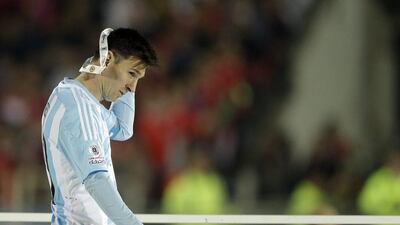Argentina enforcer Javier Mascherano was at a loss to explain his team’s latest tournament defeat after Saturday’s loss to Chile at the Copa America.
Mascherano has now finished on the losing side in three Copa America finals – 2004, 2007 and 2015 – as well as last year’s World Cup final.
The veteran Barcelona midfielder admitted he was struggling to make sense of seeing Argentina crash to a 4-1 penalty shoot-out loss.
“Three Copa America finals, three defeats ... I can’t explain the losing streak,” a dejected Mascherano said.
“Overall I thought we had a very good Copa America but we have fallen short once again. But you have to give credit to the opponents as well,” Mascherano added, praising the tactical nous of Chile coach Jorge Sampaoli.
“We just didn’t seem to have that little bit of luck that you sometimes need to have to win in finals. Is it karma? I don’t know,” Mascherano added.
Mascherano cut a desolate figure in the centre circle as Argentina prepared for penalties, his eyes welling with tears amid excruciating tension at Santiago’s Estadio Nacional.
Although the 31-year-old tasted success when Argentina won the Olympic football gold medal in 2004 and 2008, he has never won a major title in the famous blue and white jersey.
Meanwhile, for Lionel Messi, it’s another tournament, another shattering defeat – and another round of unfavourable comparisons to Diego Maradona.
Messi was left reflecting on another bitterly familiar failure here after the final defeat.
It was the second time in 12 months Messi had finished on the losing side in a major final following Argentina’s extra-time loss to Germany at the World Cup last year.
“This generation is desperate to win a title with the national team,” Messi had said before this year’s Copa America.
“As a team, we deserve to win something and it would mean so much after the World Cup where we came so close.”
Saturday’s defeat will reignite the debate about where Messi deserves to be ranked in the pantheon of the very greatest players to have graced the sport.
For many, his extraordinary achievements at club level with Barcelona over the past decade have already guaranteed him a place alongside Pele and Maradona.
Others insist that his failure to lead his country to international glory puts him just behind Pele and Maradona, who won four World Cups between them.
Statistically at least, Messi outscores Maradona in almost every department, with 46 goals in 103 international appearances compared to Maradona’s 34 goals in 91 games.
At club level Messi has amassed 412 goals in 482 games, compared to Maradona’s 312 in 588 matches.
Messi has won three European Cups with Barcelona; the famous trophy is conspicuously absent from Maradona’s CV.
Messi has been named world footballer of the year four times; Maradona earned the accolade only once.
Yet the arguments invariably circle back to trophies at international level.
Although Messi played a key role in Argentina reaching the final of last year’s World Cup in Brazil, his achievements at international level have not seared themselves in the memory in the way that Maradona’s did during his displays in the 1986 World Cup.
Maradona is largely credited with single-handedly guiding Argentina to that World Cup title in Mexico, scoring a series of memorable individual goals against England and Belgium along the way.
Even in the 1986 final, when he was well-shackled by Germany’s Lothar Matthaus, Maradona was able to prove a decisive influence, supplying the sublime first time pass to set up the game’s winning goal.
Messi can justifiably reflect, however, that the margins are impossibly fine.
In both last year’s World Cup final and this year’s Copa America final, Messi had helped create gilt-edged chances for Gonzalo Higuain that the striker squandered on each occasion.
Had either of those gone in – and helped Argentina to victory instead of defeat – Messi’s right to be bracketed with Maradona and Pele would not be in doubt.
Follow us on Twitter @NatSportUAE

